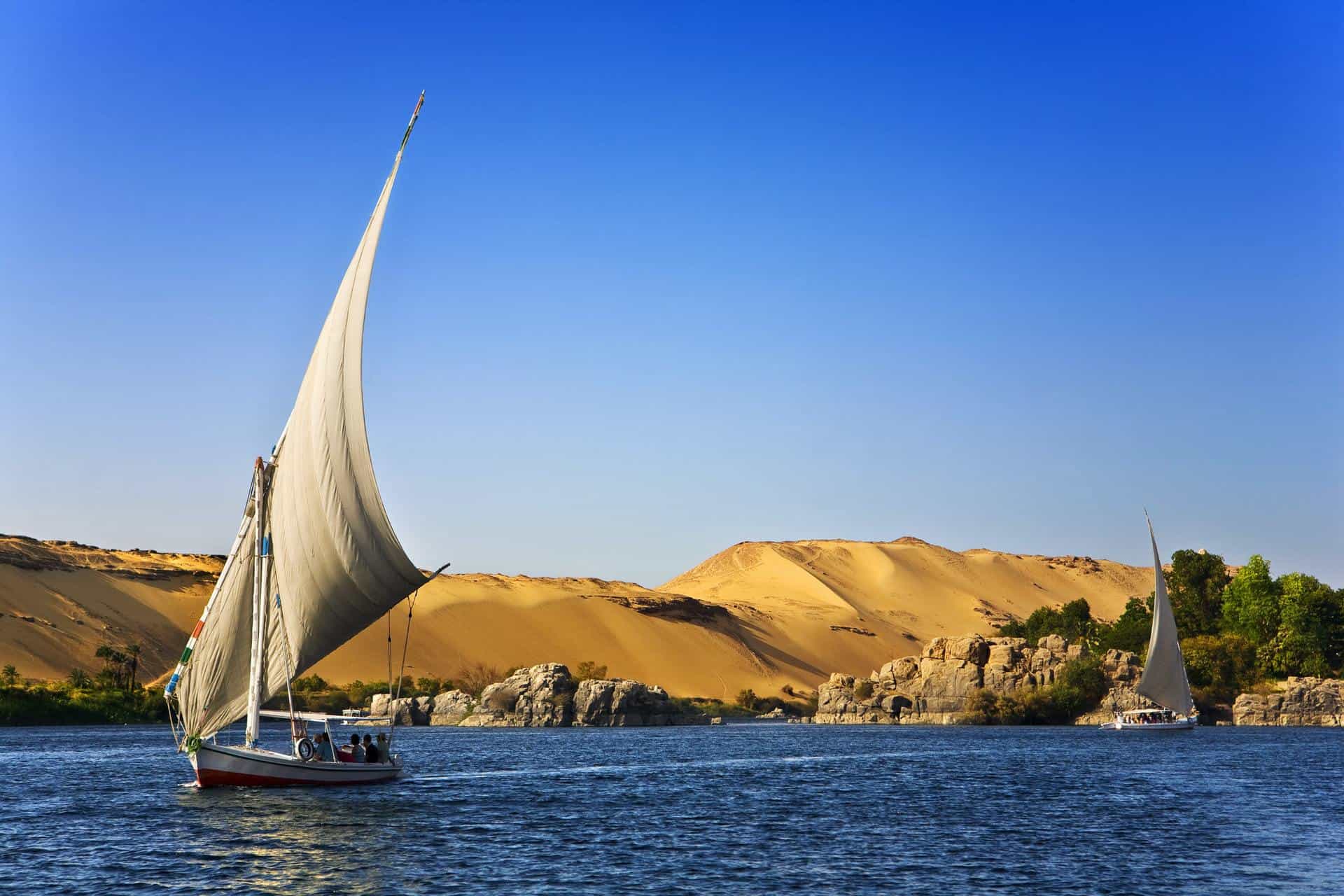Journey Down the Nile – Egypt

Updated On: April 18, 2024 by Ahmed Samir
A journey down the Nile offers an incredible contrast between an impressive civilization, people with golden hearts, and a distinctive culture. And today, you are invited to discover Egypt from the Nile River.
Egypt, the land of pharaohs, pyramids, and unparalleled history, has always captivated the imagination of travellers worldwide. One of the most iconic and timeless experiences Egypt offers is a journey down the Nile River, which has been the lifeblood of this ancient civilization for millennia. This article will take you on a virtual tour down the Nile, exploring its rich history, stunning landscapes, and the treasures that await those who embark on this remarkable adventure.
The Nile River: A Source of Life and History
The Nile River is not just a river; it’s a cradle of civilization and a source of life for the people of Egypt. Stretching approximately 4,135 miles, it holds the title of being the longest river in the world. Its two main tributaries, the White Nile and the Blue Nile converge in Sudan’s capital, Khartoum, and from there, the Nile flows northward through Egypt before emptying into the Mediterranean Sea.
The Nile has played an essential role in the development of Egyptian civilization for over 5,000 years. The ancient Egyptians revered it as a divine gift, attributing their prosperity and survival to its annual inundation, which deposited fertile silt along the riverbanks. This lush and arable land allowed them to cultivate crops and thrive in an otherwise barren desert.
Today, the Nile remains a vital lifeline for Egypt, providing water for agriculture, industry, and daily life. It also offers an incredible journey for those seeking to explore the country’s rich past and vibrant present.
Starting the Journey: Cairo and Giza
Any journey down the Nile typically begins in Egypt’s bustling capital, Cairo. Here, you can explore the city’s vibrant markets, delve into its fascinating history, and marvel at the awe-inspiring pyramids of Giza. The pyramids, including the Great Pyramid of Giza, built during the 26th century BC, are a testament to ancient Egyptian ingenuity and serve as an enduring symbol of the country.
After exploring Cairo, your Nile adventure begins as you embark on a cruise or riverboat journey southwards. Nile cruises offer a comfortable and luxurious way to experience the river’s beauty and explore its historical sites.
Luxor: A Portal to Ancient Wonders
The city of Luxor is the first significant stop on your journey down the Nile. Known as the “World’s Greatest Open-Air Museum,” Luxor is a treasure trove of ancient Egyptian history and architecture. Here, you can visit the Karnak Temple Complex, a vast temple precinct dedicated to the god Amun-Ra, and the Luxor Temple, which was once linked to Karnak by an avenue of sphinxes.
No visit to Luxor is complete without exploring the Valley of the Kings on the west bank of the Nile. This vast cemetery is home to the tombs of pharaohs, including the legendary Tutankhamun. The intricately decorated and preserved tombs provide a glimpse into the ancient Egyptian beliefs about the afterlife.
Continuing southwards, you’ll come across the city of Aswan, where the river takes on a more serene and scenic character. Aswan is known for its stunning natural beauty and cultural significance.
Aswan: A Hub of Culture and Scenic Beauty
One of the highlights of Aswan is the Aswan High Dam, an engineering marvel that controls the Nile’s annual flooding, ensuring a consistent water supply for Egypt. The dam also created Lake Nasser, one of the largest artificial lakes in the world, offering picturesque views and opportunities for leisurely boat rides.
Aswan is also famous for its granite quarries, which provided the materials for many ancient Egyptian monuments, including the unfinished obelisk, still attached to the bedrock. The city is also home to the beautiful Philae Temple, dedicated to the goddess Isis and relocated to Agilkia Island after the construction of the Aswan High Dam.
Sailing on Lake Nasser and Exploring Abu Simbel
A unique aspect of many Nile cruises is sailing further south on Lake Nasser, a tranquil and less-visited part of the Nile. Along this route, you’ll encounter the magnificent Abu Simbel temples, built by Pharaoh Ramesses II to commemorate his victory at the Battle of Kadesh. The temples are renowned for their colossal statues and intricate carvings and are a UNESCO World Heritage Site.
Back on the Nile, the journey continues to Edfu and Kom Ombo, two cities that offer a glimpse into the Greco-Roman influence on ancient Egypt.
Edfu: A Temple Dedicated to Horus
Edfu is home to one of the best-preserved temples in Egypt, the Temple of Horus at Edfu. This temple, dedicated to the falcon-headed god Horus, is a marvel of ancient architecture and vividly portrays ancient Egyptian religious rituals and beliefs. Its towering pylon and beautifully preserved hieroglyphs make it a must-visit destination for history enthusiasts.
Kom Ombo: The Double Temple
Kom Ombo boasts the unique Temple of Kom Ombo, dedicated to both the crocodile god Sobek and the falcon god Horus. This double temple is notable for its dual design, with duplicate halls and sanctuaries for each god. The site also houses a fascinating collection of mummified crocodiles, reflecting the veneration of Sobek.
Sailing Towards the Final Destination: Aswan to Luxor
After exploring the wonders of Edfu and Kom Ombo, your Nile journey will eventually take you back towards Luxor. This return trip offers a different perspective of the river and the opportunity to revisit some of the sites you explored earlier in your adventure.
Exploring Luxor Once More
Upon your return to Luxor, you may choose to revisit some of the sites you explored earlier, such as the Valley of the Kings, Karnak Temple, or the Luxor Temple. Alternatively, you can explore additional gems hidden in the city, such as the Mortuary Temple of Hatshepsut, the only female pharaoh to reign as a full-fledged king.
A leisurely sail on the Nile, surrounded by the timeless beauty of Egypt’s landscapes and monuments, can be an unforgettable experience. The Nile’s reflective waters, flanked by lush green banks and the occasional desert vista, offer a serene setting that contrasts with the bustling cities and archaeological wonders encountered onshore.
Nile Cuisine: A Taste of Egypt’s Culinary Delights
Every journey down the Nile would be complete with sampling Egypt’s diverse and delicious cuisine. Egyptian food is a fusion of flavours influenced by the Mediterranean, Middle Eastern, and North African regions. Here are some culinary highlights to savour along the way:
- Koshari: A popular street food, koshari is a comforting dish made from lentils, rice, macaroni, and crispy fried onions, topped with a flavorful tomato sauce and a tangy garlic vinegar dressing.
- Ful Medames: This hearty dish consists of slow-cooked fava beans seasoned with olive oil, garlic, and spices. It’s often enjoyed for breakfast with pita bread.
- Ta’meya (Falafel): Deep-fried balls or patties made from ground fava beans or chickpeas, ta’meya is typically served on pita bread with tahini sauce and salad.
- Molokhia: A famous Egyptian green soup made from the leaves of the molokhia plant, cooked with garlic and coriander and served with rice or bread.
- Fresh Fruit: Egypt is known for its succulent fruits, including dates, figs, pomegranates, and citrus varieties. Be sure to try the local produce.
- Aish Baladi: Also known as Egyptian flatbread, aish baladi is a staple of Egyptian cuisine. It’s a round, slightly leavened bread baked in wood-fired ovens and served with most meals.
- Egyptian Desserts: Indulge in sweet treats like baklava, basbousa (a semolina cake soaked in syrup), and kunafa (a pastry from shredded wheat filled with sweet cheese or nuts).
Navigating Egyptian Cuisine
While on your Nile journey, your cruise or riverboat will likely offer a range of delicious Egyptian dishes. Many tours also include onboard dining experiences that allow you to savour authentic Egyptian cuisine while enjoying stunning river views. Don’t be afraid to try new flavours and dishes—you’ll discover Egyptian cuisine is as diverse as the country’s landscapes and culture.
Cultural Experiences Along Your Journey Down the Nile
In addition to its ancient monuments and natural beauty, Egypt offers numerous cultural experiences that allow you to connect with its rich heritage. Here are some activities to consider during your journey down the Nile:
- Nubian Village Visit: Take a boat trip to a Nubian village along the banks of the Nile. Here, you can immerse yourself in Nubian culture, enjoy traditional music and dance performances, and interact with the welcoming locals.
- Traditional Felucca Ride: Experience the Nile in a traditional felucca sailboat. These small wooden vessels offer a tranquil and eco-friendly way to explore the river and witness the daily life along its banks.
- Nile-side Markets: Explore local markets and bazaars in the cities and towns you visit. Bargain for souvenirs, spices, textiles, and handicrafts, and get a taste of Egyptian market culture.
- Sound and Light Shows: Many of Egypt’s historical sites, such as the Giza Pyramids and Karnak Temple, host evening sound and light shows that bring the ancient past to life through captivating narratives and dramatic lighting.
- Traditional Music and Dance Performances: Enjoy live music and dance performances showcasing Egypt’s rich cultural heritage. These shows often include conventional instruments like the oud and darbuka.
- Spa and Wellness: Some Nile cruises offer spa and wellness services, allowing you to unwind and rejuvenate with massages and other treatments while surrounded by the serene beauty of the Nile.
Conclusion
A journey down the Nile is a voyage through time and a celebration of Egypt’s enduring legacy. As you cruise along its tranquil waters and explore its historical sites, you’ll gain a deeper appreciation for the remarkable achievements of the ancient Egyptians and the vibrant culture that thrives along the riverbanks today.
Whether you’re an avid historian, a nature lover, a culinary enthusiast, or simply seeking a unique and enriching travel experience, a journey down the Nile promises to be an unforgettable adventure. It’s a testament to the enduring allure of Egypt. In this country, the past and present merge seamlessly, creating a timeless destination that continues to captivate the hearts and minds of travellers worldwide. So, prepare to sail on the Nile, where history, beauty, and culture converge to create a remarkable journey.






